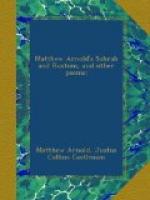[183]
=261. Silenus.= A divinity of Asiatic origin; foster-father to Bacchus and leader of the =Fauns= (l. 265), satyr-like divinities, half man, half goat, sometimes represented in art as hearing torches (l. 274).
=275. Maenad.= A bacchante,—a priestess or votary of Bacchus.
=276. Faun with torches.= See note, l. 261.
What is the situation at the beginning of the poem? What effect does the “liquor” have upon the youth? Why is the presence of Ulysses so much in harmony with the situation? How does he greet Circe; how the youth? What does his presence suggest to the latter? Why? Note the vividness of the pictures he describes; also the swiftness with which he changes from one to another. What power is ascribed to the poet? Why his “pain”? What effect is gained by closing the poem with the same words with which it is opened? Why the irregular verse used?
DOVER BEACH
In this poem is expressed the peculiar turn of Arnold’s mind, at once religious and sceptical, philosophical and emotional. It is one of his most passionate interpretations of life.
=15. Sophocles= (495-406 B.C.). One of the three great tragic poets of Greece. His rivals were AEschylus (526-456 B.C.) and Euripides (486-406 B.C.).
=16. AEgean Sea.= See note, l. 236, The Scholar-Gipsy.
* * * * *
Image the scene in the opening stanzas. What is the author’s mood? Why does he call some one to look on the scene with him? What is the “eternal note of sadness”? Why connect it in thought with the sea? Why does this thought suggest Sophocles? What thought next presents itself to the author’s mind? From what source must one’s help and comfort then be drawn? Why so? Why the irregular versification? State the theme of the poem. [184]
PHILOMELA
“Philomela unites the sensibilities and intellectual experience of modern Englishmen with the luminousness and simplicity of Greek poetry.”—SAINTSBURY.
The myth of the nightingale has long been a favorite with the poets, who have variously interpreted the bird’s song. See Coleridge’s, Keats’s, and Wordsworth’s poems on the subject. The most common version of the myth, the one followed by Arnold, is as follows:—




